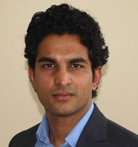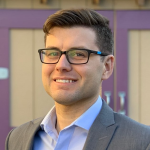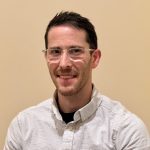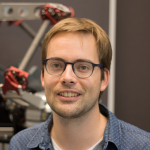ASPE Early Career Award
Award Description and Purpose
ASPE benefits greatly from the infusion of energy and new ideas brought by members who are in the early stages of their career. The purpose of this award is to recognize outstanding technical contributions from this group and to encourage them to continue to be active in the Society.
ASPE is proud to recognize the following Early Career Award Winners

Dr. Kumar Arumugam – NIST
Dr. Kumar Arumugam is recognized for his dynamic and impactful contributions which have significantly advanced the field of precision engineering and enriched our professional community. Dr. Arumugam’s technical achievements are exemplified by his recent work at the National Institute of Standards and Technology (NIST), where he led the completion and delivery of the world’s first primary mass standard Kibble balance to a laboratory outside of a national metrology institute. This groundbreaking accomplishment underscores his expertise and innovative approach in precision engineering.
In addition to his technical prowess, Dr. Arumugam has demonstrated exceptional leadership and commitment to education and professional development. He has taken on pivotal roles in coordinating the annual student challenge, fostering the next generation of engineers. His annual contributions to the proceedings of both the American and European Societies focused on metrology and precision design highlight his dedication to advancing our understanding and practice of precision engineering.
Dr. Arumugam’s scholarly contributions include being selected to co-author the revised version of Stuart Smith’s seminal work, “FLEXURES,” which is regarded as the bible of precision engineering. Furthermore, he co-teaches a highly popular tutorial on flexures, sharing his deep knowledge and expertise with peers and newcomers alike.
Through his committee activities, tutorials, and numerous scholarly publications, Dr. Arumugam has made substantial and impactful contributions to both the academic community and the general practice of precision engineering. His work not only reflects his technical acumen but also his passion for advancing the field and supporting his colleagues and students.
We have no doubt that Dr. Arumugam will continue to make significant contributions to the field of precision engineering. He is a dedicated, innovative, and inspiring professional who has already achieved so much and will undoubtedly achieve even more in the future.

Dr. Brandon D. Chalifoux – University of Arizona
Brandon Chalifoux is an Assistant Professor in the Wyant College of Optical Sciences at the University of Arizona where he directs the Lightweight Optics Laboratory. He earned his doctorate in mechanical engineering from the Massachusetts Institute of Technology in 2019 with a dissertation on the figure correction of thin plate and shell substrates using stress generated by ion implantation. Brandon’s general research interests are in establishing techniques for the precision fabrication, mounting, and alignment of lightweight optics. One notable application of these optics are in space telescopes, and particularly in x-ray telescopes, but the techniques extend to novel micro-optical mechanical resonators in glass and glass-ceramics with additional applications in inertial sensing and biomedical technologies. Most notably, Brandon is first and foremost a selfless teacher and colleague with a dedication to educating students and building professional networks that strengthen our precision engineering community.

Dr. Michael Cullinan – University of Texas at Austin
Dr. Michael Cullinan is currently a professor at the University of Texas at Austin. His involvement with ASPE began as a student and has continued with his active participation in various ways including his current chairmanship of the Micro‐Nano TLC (MNTLC), organizer of two MNTLC topical meetings and as the associate editor for the journal of the Society. He is a prolific author with many publications in the Society’s journal and conference proceedings.
Dr. Cullinan is recognized for his application of precision engineering to micro and nano scale manufacturing and metrology. His contributions include development of additive manufacturing at the micro‐nano scale, in‐line nanometrology for roll‐to‐roll processes and MEMS sensors for testing nanoscale additive manufacturing processes.

Dr. Nick Horvath – Lockheed Martin
Dr. Nick Horvath received his Ph.D. from the University of North Carolina at Charlotte. His pre‐university practical experience as a machinist and nuclear-certified welder helped him to become one of the top students at the university and aided him in his research activities. As an undergraduate he led a senior capstone design team that demonstrated the design, manufacture, and assembly of a miniaturized snap‐together three‐mirror off‐axis freeform telescope with only seven total parts. This work was the subject of a paper at the 2017 Annual Meeting. He continued to work in diamond machining of free‐form and snap-together optics during his Ph.D. studies. Following graduation, he moved to Oak Ridge National Lab where drew on his experience in optical design and fabrication to create a new thrust area in machining of free‐form optics from silicon carbide from additively manufactured preforms. He is now a Staff Research Scientist at Lockheed Martin, and has published in Precision Engineering, as well as several other prestigious journals, and shows every indication of being a life‐long valuable member of ASPE.
Dr. Horvath is recognized for his leadership and contributions to a wide range of precision design and manufacturing applications, including ultra‐precision machining, the design and fabrication of snap-together optical assemblies, and the use of additive manufacturing techniques to create silicon carbide preforms for lightweight optics.

Dr. Neil J. Naples, AMETEK Precitech
Dr. Neil Naples is recognized for his development and publication of techniques for toolpath generation applied to the diamond turning of freeform optics. He is presently combining his experience as a classically trained machinist with this fundamental research on trajectory planning as a Director of Applications at Ametek Precitech. Neil received a doctorate from the Department of Integrated Systems Engineering at the Ohio State University in 2018.

Dr. Marijn Nijenhuis – University of Twente
Marijn Nijenhuis is an Assistant Professor in the Precision Engineering group at the University of Twente, where he earned his doctorate in 2019 with a specialization in the analysis of spatial flexure mechanisms. At this early stage in his career, he has already published eleven manuscripts representing substantial contributions in flexure mechanism analysis and in the implementation of flexure-based precision motion control systems. His thesis clearly and concisely provides a complete analysis of the linear solutions for small displacements and rotations of three-dimensional flexure elements, but also includes the non-linear analysis necessary for longer-range motions. These were realized in the design of a three-dimensional spherical flexure joint and its integration into a large-stroke flexure-based hexapod. Marijn has further worked to share and disseminate his findings throughout the precision engineering community through an accessible web-based package for flexure design and by preparing materials for an ASPE tutorial.

Professor Lei Zhou, University of Wisconsin-Madison
Prof. Lei Zhou is recognized for her development of electromagnetic actuators and control techniques applied to high-precision positioning systems. She has expanded on her work in magnetic levitation to form a new overall control co-design approach that combines over-actuation with selected compliance for broader applicability across a range of mechatronic design applications. Prof. Zhou received her doctorate from the Massachusetts Institute of Technology in 2019 and is an incoming faculty member at the University of Wisconsin-Madison.

